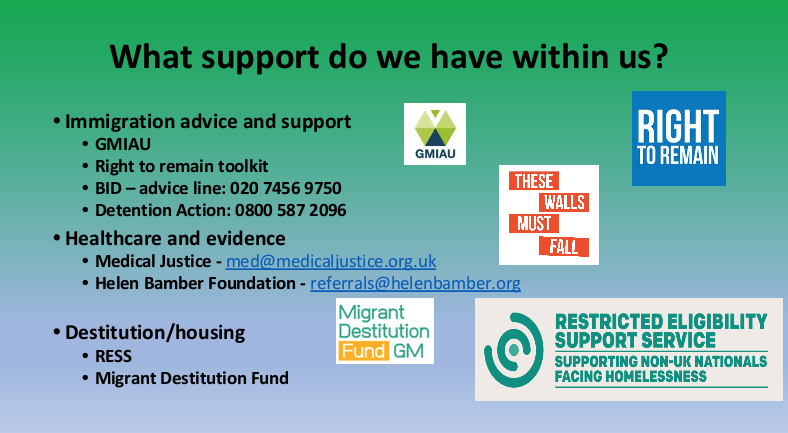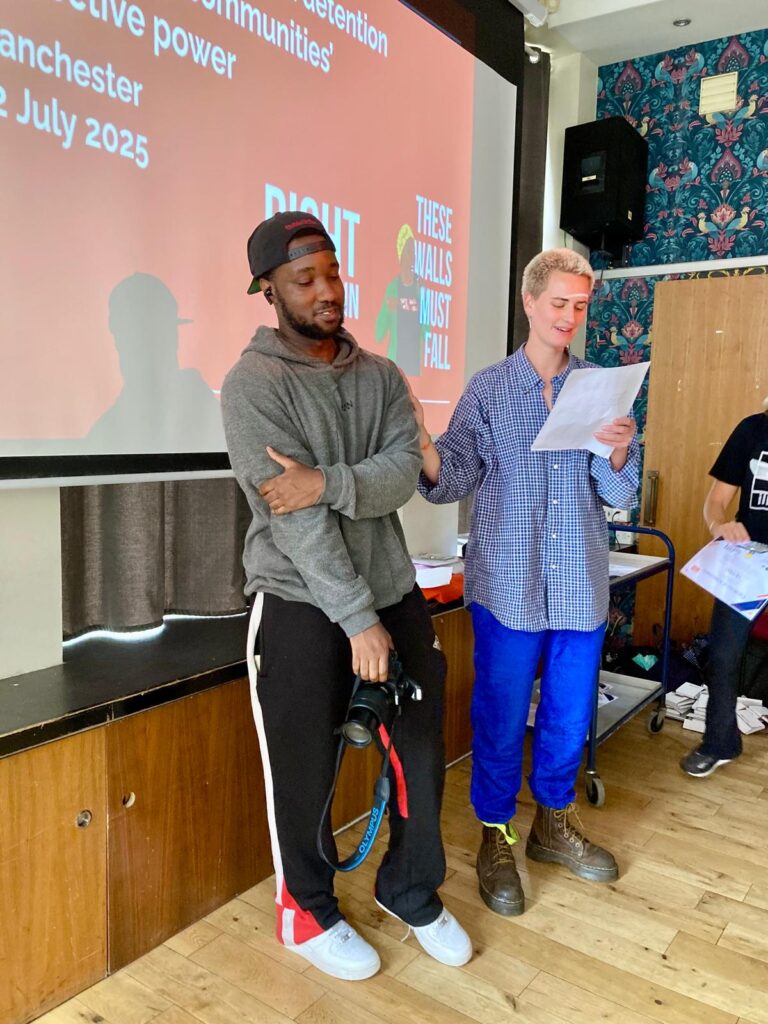
On Tuesday 22 July, the Right to Remain team were back in Manchester, hosting our sixth session in the series “Thinking with our Communities; Detention and Enforcement.” The purpose of this event was to practically understand what is needed to resist enforcement in the face of the Labour government’s eagerness to ramp up detentions and removals.
In these events we aim to share vital information that our communities need, explore what radical solidarity looks like in this context, and how we can build collective power together. Central to this event, and all Right to Remain events is a commitment to placing lived experience at the heart of the movement.
We began the day with an introduction to immigration detention, led by our director Eiri, who also connected the discussion to insights from our recent Free Fatou campaign. After nearly two months in detention and three attempted removals, Fatou was finally released on June 18th. A deeply moving moment came halfway through Eiri’s presentation, when Fatou herself arrived, having travelled from Liverpool to join us. She was welcomed with applause, warmth, and a powerful sense of community, as the room felt the tangible impact of solidarity in action.
After a fantastic lunch of curry, rice, samosas and salad, our friends at GMIAU delivered their own presentation on detention, including how to get support if you are based in greater Manchester.
Reflecting on discussion from the session, the FreeFatou campaign was a powerful experience of collective resistance, care, and learning. It showed us that solidarity is not just a word, it’s something we build daily, through connection, trust, and action.
One strong theme that emerged was how deeply immigration detention affects whole communities. As one attendee put it: “We all felt it, because we all wear those shoes.” Fatou’s detention may have happened to one person, but it resonated with everyone who has lived through the system.
We saw how valuable groundwork is, as relationships and local organising enabled quick and strategic responses. From direct action to contacting MPs, success came from collaboration and everyone playing to their strengths.
But the campaign also highlighted serious gaps. Many people, both in the public and in the sector, don’t understand detention, reporting, or deportation. At the Liverpool demo, passersby were shocked by what they learned. A simple factsheet could have helped inform more people, and is something Right to Remain has since developed – see below.
Clearly, more public legal education and building our collective knowledge is necessary. If you or your organisations are interested in attending our introduction to immigration detention online sessions, please do get in touch with Esther – esther@righttoremain.org.uk.
Community mobilisation was limited to small grassroot groups who are already overstretched: organisations with more resources were absent. Perhaps there was fear, both about funders and how that relationship would be affected, and about being seen to take sides and campaigning. This left campaigners with lived experience feeling abandoned at the moment support was most needed.
For many, campaigning and protesting while living under immigration control carries real risks. People spoke of having to “wear a mask” to survive, of not feeling safe being visible. The fear is real, and so is the need for deeper support and protection for lived experience campaigners. We are now looking at how to better equip ourselves, through knowledge, factsheets, and mutual aid, for next time.
We ended the day on a high with celebration, with an awards ceremony for These Walls Must Fall campaigners in recognition of their courage, contribution, and commitment to justice as a part of Right to Remain. It was a moving ceremony, filled with love and joy, and surprise as the campaigners weren’t aware of the plan to honour them.
Moving forward, we’re preparing for the National Day of Solidarity to End Immigration Detention on 18 October. Read more about it here. You can join us at the demo outside Derwentide IRC in Durham, or you can plan a local action in your area. The next date for your diary is an online rally to prepare for the event – on 16 September.
















Discussion: